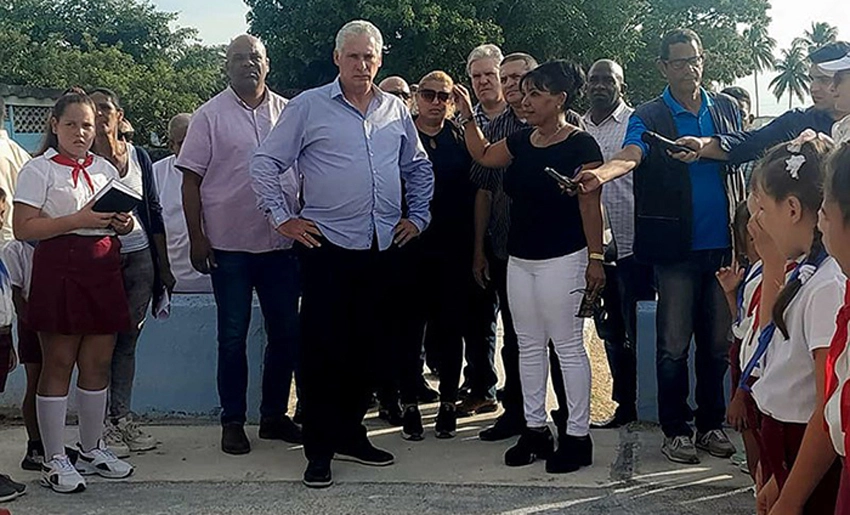Last June 10th, Yaguabo was once again under water. The slope that protects the settlement from the floods of the neighboring river gave way due to the heavy rains.
The 235 homes and their 554 residents were affected in one way or another. Four months later, the First Secretary of the Party’s Central Committee and President of the Republic, Miguel Díaz-Canel Bermúdez, is in Yaguabo.
On Thursday afternoon, as part of the governmental visit that began in the province of Holguin, he started there. The climatic event accelerated the intentions that Yaguabo, a purely peasant settlement, of farmers and cattle breeders, located in the middle of the Cauto plains, became a neighborhood in transformation.
Yaguabo, land of water and life
Sidewalks, a repaired elementary school that has been left as good as new, as well as the store and the doctor’s office, painted houses with embellished gardens, and even the total repair of the house that was completely destroyed by the rains, have given new life and spirit to the village.
Among the institutions that have won the hearts of these sincere and country people is the National Institute of Hydraulic Resources, whose workers and specialists were working for 60 days straight to restore the damages to the local hydraulic infrastructure, for which it dedicated more than 27 million pesos of its budget, and also contributed, together with the Ministry of Construction and other entities, to the rehabilitation of the hamlet.
Talking with people from the neighborhood, formal and informal leaders and authorities of the municipality of Cacocum, Díaz-Canel insistently asked about the future development of the community and the exploitation of the productive potential of the extensive plains that surround it, about the continuity of studies of children and adolescents, and about other crucial issues for the economic and social development of the locality, the municipality and the province.
CATTLEMEN OF BLOOD AND FAITH
Arcadio, the patriarch; Roberto, the boss; Robin, the son to whom he is passing on experience and command; and Leandro, the grandson who will inherit wisdom and labor, are the heads of the Infante family.
Purebred cattle breeders, the centennial tradition that accompanies them makes them look joyful for the productive results and the beauty of their animals, some F-1s based mostly on zebu that are the envy of anyone, although they are far from being purebred.
Yaguabo, land of water and life
On his way to the municipal capital of Cacocum, from the community of Yaguabo, Díaz-Canel went to talk to the Infantes, to learn about their wisdom and will. The economic limitations that mark the entire productive and agricultural sector are also felt here, but in the face of adversity, they grow.
Of the 13,750 liters of milk they have contracted for this year, by the end of September they had already delivered more than 10,000 to the dairy industry; however, if they had the appropriate infrastructure and input conditions, they could increase their production several times over, according to the Minister of Agriculture, Ydael Pérez Brito.
Yaguabo, land of water and life
With a score of cattle farmers like the Infantes, Díaz-Canel reflected, Cacocum, with a population of some 38,000 inhabitants, could be self-sufficient in milk and meat.
The question is, he said, why experiences like theirs cannot be multiplied. That was the challenge he left to this family of cowboys: to contribute so that other cattle farmers in the municipality can have the same results, sharing experiences and knowledge.
Relying more on local food
So far we have worked with the concept that the main source of food for the Cuban population is what the country imports centrally and distributes with the concept of social justice and equity, but that must change, said Diaz-Canel, in an exchange with members of the Board of Directors of the municipality of Cacocum.
Yaguabo, land of water and life
Most of what the population consumes should be what is produced in each place, with the Food Sovereignty Program, and everything that the country imports will be to increase supply.
For that, he specified, it is necessary to produce, because there is not enough money to buy food which, as time goes by, becomes more expensive, creating a difficult situation for the world, which has led the FAO to announce world famine, due to wars, climate change and the aftermath of the COVID-19.
We have to change this situation, and not live on imported food. In the last two months we have had to give the basic food basket in portions because the prices of food and freight have risen a lot, he recalled.
Yaguabo, land of water and life
If the food supply of the municipality is solved, the food supply of the provinces and the country is solved, he said, after stressing that, in order to achieve food sovereignty, it is necessary to ensure the availability of healthy food, with good prices and quality, issues that must be taken into account in the plans, from sowing to harvesting. from sowing to harvesting.
With information by Germán Veloz Placencia – Granma.cu / Translated by Radio Angulo
- Installation of Photovoltaic Systems in Rural Communities in Holguin - 19 de January de 2026
- 39th City Salon Opens in Holguin - 19 de January de 2026
- Habanos Festival Among Cuba’s Most Important Tourism Events - 19 de January de 2026

